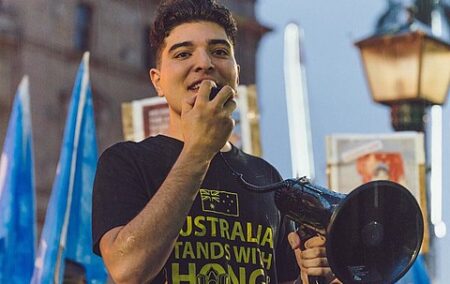Last week, a student at the University of Queensland in Australia lost an appeal against suspension from the institution. This has its roots in a demonstration in July 2019 against the undermining of liberties in Hong Kong by the People’s Republic of China.
The organiser of the demonstration, Drew Pavlou, a member of the student senate, was attacked by what appeared to be a group of China supporters. It is unclear whether they were affiliated with the university (university officials were unable to identify them).
Pavlou kept up his activism – some of it quite theatrical, such as donning a protective suit and placing a sign reading ‘Covid-19 Biohazard: Condemned’ on the entrance to the office of UQ vice chancellor, Peter Høj– and endured a stream of threats against his safety and that of his family.
He was suspended for two years from the university in May. The university denied this was as a result of his activism, but of misconduct. Pavlou condemned the process as unfair, and his legal team claimed that important documents had been withheld from them.
At this time, the University’s Chancellor Peter Varghese said that ‘there are aspects of the findings and the severity of the penalty which personally concern me.’
The judgement in last week’s appeal moderated the findings and reduced the penalties somewhat. Pavlou remarked: ‘UQ still achieves its main goal of removing me as an elected student representative, their supposed lenience is just a face-saving PR move.’
Pavlou’s case has attracted widespread interest in Australia and beyond, as many interpret it as illustrating expanding Chinese influence on foreign institutions, and a willingness of the latter to accommodate it.
The University of Queensland draws major pecuniary benefits from Chinese students who study there. (Protests in support of other causes, targeting other countries, are common on the campus, but do not appear to draw this level of action.) It is also home to a Confucius Institute, a Chinese-sponsored body that (in theory) promotes Chinese language and culture, but is widely believed to be a major component of China’s propaganda efforts. Xu Jie, Chinese Consul-General in Brisbane, was last year named a visiting professor at the university.
The Consul-General played a notable role in the controversy by praising the group that attacked Pavlou’s demonstration as ‘patriots’, and accusing him and his associates of ‘anti-China separatist activities’. (The latter are serious crimes in China, but no crime at all in Australia.)
Pavlou announced at the end of June that police were investigating the Consul-General’s ‘efforts to incite and direct political violence against Australian citizens’. He also noted that the university intended to pay for Xu’s defence.
Image: DrewPavlou99 / CC BY-SA (https://creativecommons.org/licenses/by-sa/4.0)

